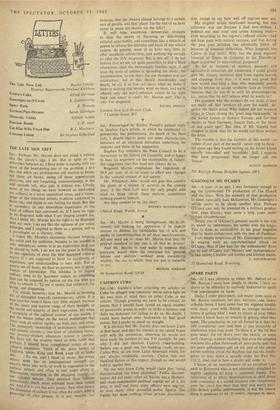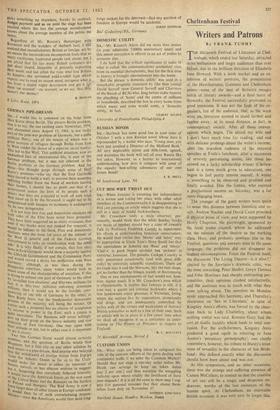SPARE PARTS SIR.—If I was offensive to either Mr. Adrian
or to 'Mr. Boston I must bow deeply in shame. I have no desire to be offensive to anybody dedicated to uplift --of merchandise or busts.
Daily. I order piece-parts, not major items such as Mr. Boston mentions, but tiny, intricate, odd, indes- cribable items. I have never had the slightest trouble over many years with British or foreign manufac- turers in getting what I want by return of post. Other dealers I know have no trouble in getting what they want. The conclusion we are all forced to is that the odd complainer now and then is just incapable of explaining what they want. To them it is 'the bit that goes under the bit that's over the switch' or some such claptrap, without realising that even the simplest machine has often thousands of piece-parts, and that the poor unfortunate girl on the end of the phone knows nothing about the machine but has the intelli- gence to take down a specific order for Part No. 113/2. And that is how a dealer will order it.
I know of no manufacturer of an excellent type such as Kenwood who is not absolutely delighted to supply anything to keep a customer happy. The reluctance of so many manufacturers to deal direct with consumers is a sordid financial one—experience over the years has been that they just won't pay! The British public, unfortunately, is not the honest thing it professes to be. It orders, changes its mind,
THE SPECTATOR, OCTOBER 12. picks something up elsewhere, breaks its contract, dodges Payment and so on until the stage has been reached where the less the average manufacturer knows about the average member of the public the better.
Regardless of Mr. Boston's shenanigan with Kenwood and the wonders of rhubarb fool, 1 still contend that manufacturers, British or foreign, are by no means the inconsiderate incompetent fools that so many vociferous, frustrated people rant about, but I am afraid that far too many British customers are :lost sheer stupid, incapable of precisely explaining their needs and too often the type who lost Britain its Empire—the servanted pukka-sahib type which expects one to read its vacant mind, recognise what it has from a stupid vague description and get it lir them on aceounr—on account, as we say, that th y haven't the money!
B. DUNCAN







































 Previous page
Previous page